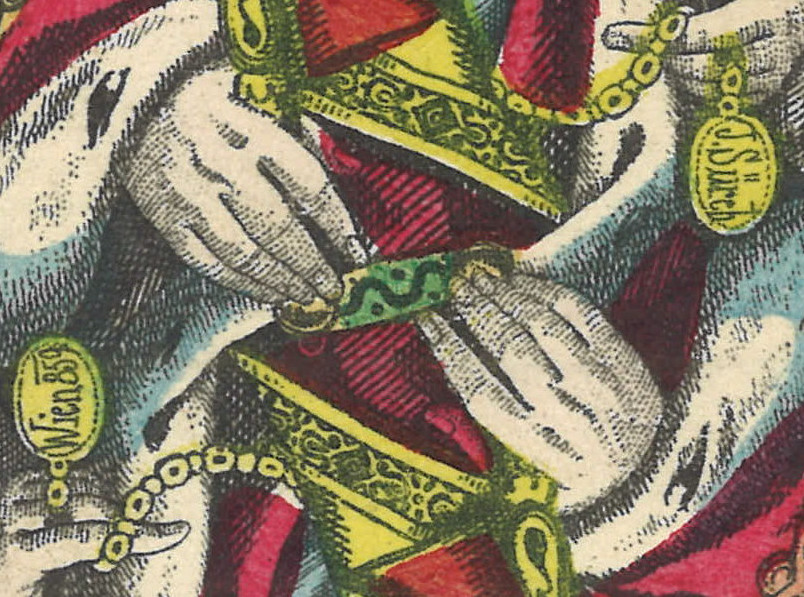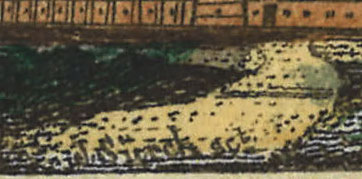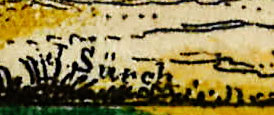Joseph Sürch, Engraver
Joseph Sürch, a prominent Viennese engraver, made significant contributions to card sheet engraving and is renowned for his work on various tarock decks.
Joseph Sürch (1811 - July 1877) was a prominent Viennese engraver whose work significantly contributed to the field of card sheet engraving. Born and raised in Vienna, Sürch trained as an engraver at the Akademie der bildenden Künste in Wien. He is featured as an artist in the 1880 edition of the Biographisches Lexikon des Kaiserthums Oesterreich (Biographical Encyclopedia of the Austrian Empire).
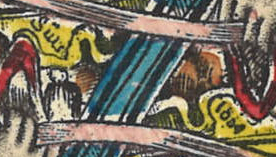
Above: the signature “Sürch / 1854” appears on the Cavalier of Hearts card from the Industrial und Glück Tarok deck.
From 1847 to 1849, Sürch worked for the influential Viennese fashion magazine Wiener Zeitschrift für Kunst, Literatur, Theater und Mode (Viennese Journal of Art, Literature, Theatre and Fashion). His graphic work, which includes common genre pictures, is not extensively documented and does not deviate significantly from the period average. Today, some of his works can occasionally be found in online stores.
Sürch also made his mark in the production of playing cards. In the 1850s, he worked with the card company of Joseph Glanz in Vienna. Many of his works are signed, making it possible to easily identify some of his engravings.
Industrie und Glück Tarok

Above: Queen of Spades, the Fool and Card XX.

Above: Card XIV depicts a lively scene with a man and woman dancing, Card IIII features a rider on horseback, and Card II shows an eagle with a crown perched on a rock with the inscription “INDUSTRIE UND GLÜCK,” representing ingenuity and fortune.
This deck shows a developmental version of the Industrie und Glück deck with a custom composition of tarot card images.
AffenTarock

Above, left to right: Card I features a monkey, from which the AffenTarock deck gets its name; Card II depicts a traditional genre scene with a coachman and horse; the Queen of Spades shows a woman holding a flower.
The name of this deck is derived from the German word “Affen” (monkey), inspired by the depiction on tarot card I. The tarot cards combine traditional genre scenes with vedutas of various buildings.
Wiener Veduten Tarock

Above, left to right: the King of Clubs card signed by Joseph Glanz; the Queen of Diamonds card; the reverse side of a Hearts card showing the stamp and watermark.
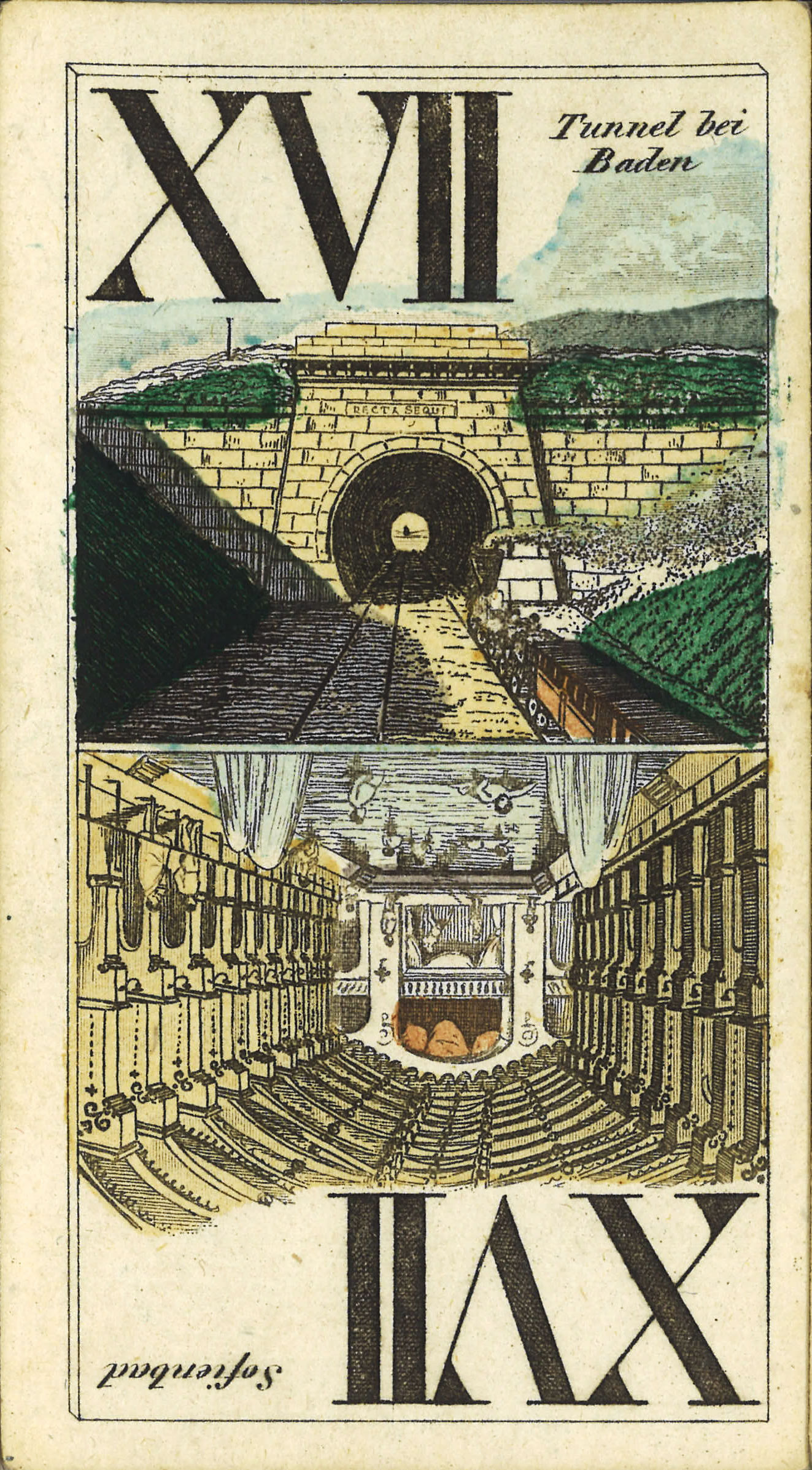
The Latin motto “Recta sequi” (Follow the right path) engraved on Card XVII from the Wiener Veduten Tarock deck.
Above: card XVII of the Wiener Veduten Tarock deck depicts the Tunel bei Baden with the motto “Recta sequi,” (Follow the right path) symbolizing the tunnel as a groundbreaking infrastructure project in the Austrian Empire.
In 1849, Joseph Glanz purchased the rival company Max Uffenheimer. As part of his product line, he built on their tarot card offerings with views and had Joseph Sürch engrave an updated version.
Above, left to right: Card XIV from the Wiener Veduten Tarock deck, and the signature “J. Sürch” appears on Card I, known as the pagat.
Despite any questions regarding the value of Joseph Sürch’s work as an artist, his contributions to card sheet engraving are unquestionable. The quality of Sürch’s engravings can be exemplified by a tarot card depicting the Tunel bei Baden motif. The card shows the first railway tunnel in the Austrian Empire, built in 1841 near the town of Gumpoldskirchen. At the mouth of the tunnel is the Latin motto Recta sequi, which Master Sürch also included on his card. The size of the letters is approximately 0.65 mm.
In 1974, 1985, and 1993, reprints of this deck were published by the Piatnik company. The first reprint was to commemorate its 150th anniversary, and subsequent reprints were part of the Edition Piatnik series.
A Small Note in Conclusion
In the December 2016 Cartorama catalog, an Industrie und Glück tarot deck by Johann Nejedly was offered for sale with the signature “Wien 1861 / J. Sürch sc” on card XIII and the Cavalier of Hearts.
References
- German Wikipedia on Joseph Sürch
- Biographisches Lexikon des Kaiserthums Oesterreich, vol. 40, p. 277

By Marek Brejcha
Member since June 13, 2024
My relationship with cards grew from playing to collecting and transformed into publishing as well. I am part of the team at Counter Clockwise, a small company that publishes traditional card games.
Related Articles

Luditz Pattern by Georg Geiselreiter
The discovery of 2024 changes the current state of knowledge of the history of this pattern.

Austrian Tarock by S.D. Modiano
Modiano’s Austrian Tarock with country scenes has been in production for over 100 years.

Songs with Flute accompaniment
Eighteenth century English engraved cards with music for voice and flute.

Ukraine playing cards
Historical figures from Ukraine’s past in a familiar Piatnik style.

MITSCHKAtzen
Clever cat designs by the Austrian artist and illustrator Willi Mitschka.

Tarock Cards by NIL Spielkartenfabrik
A deck of tarock cards from the eastern end of the ending Austro-Hungarian Empire.

Whist by Ditha Moser
Ditha Moser created this minimalist Whist deck in 1905, in the style of the Vienna Secession art mov...

Alan Tarot Deck
Reprint of a Tarock pack originally designed by Argio Orell for the Austrian Lloyd shipping company....

Gabriel Uffenheimer
Rare example of the production of Johann Gabriel Uffenheimer, Guntramsdorf, 1825.

Dr Sacheverell
Dr. Henry Sacheverell's impeachment in 1710 sparked widespread public unrest and political upheaval,...

Art pack I
Art pack featuring Old Masters, including Bruegel, Vermeer, Titian, Raphael, Caravaggio, Canaletto, ...

Karl Korab
Austrian artist Karl Korab’s first pack, displaying his use of different techniques.

Jeu de Tarot (Catel & Farcy)
Colourful version of a standard French (‘Bourgeois’) Tarot.

Johann Nejedly Tarok Cards
Johann Nejedly, a 19th-century Viennese card maker, produced Tarock cards featuring modern scenes th...

Austria Ski Team playing cards
Photos of members of the Austrian skiing team replace the normal courts on two different packs.

Grunwald 1410 – The Battle of Tannenberg
Details from the famous painting of the Battle of Grunwald (1410) by the Polish painter Jan Matejko....
Most Popular
Our top articles from the past 28 days


